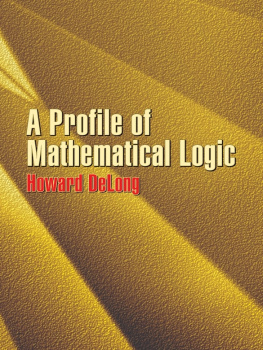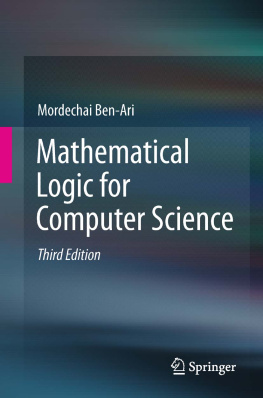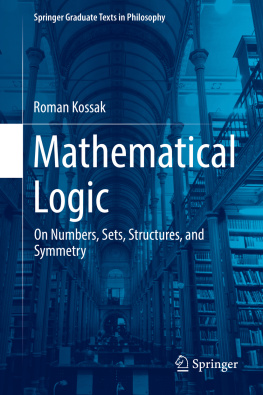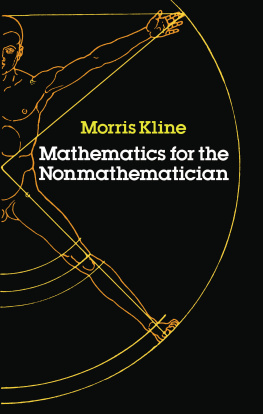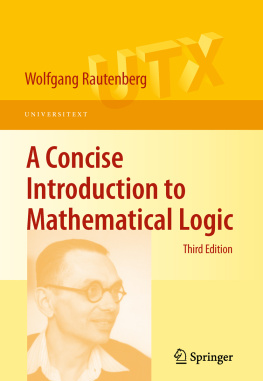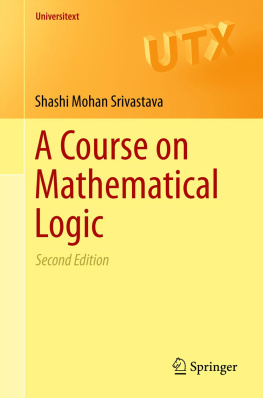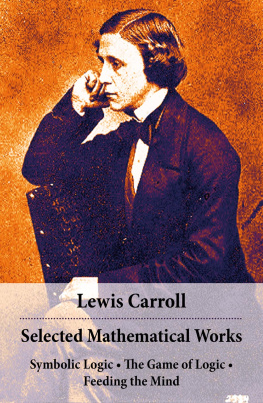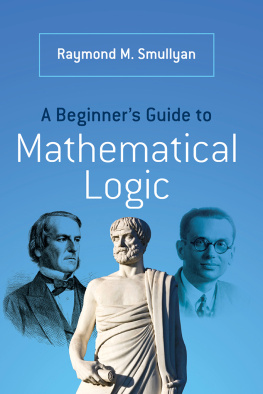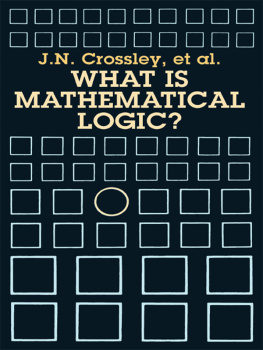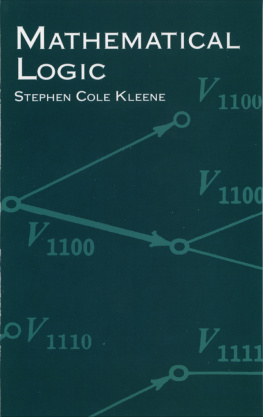DeLong - A profile of mathematical logic
Here you can read online DeLong - A profile of mathematical logic full text of the book (entire story) in english for free. Download pdf and epub, get meaning, cover and reviews about this ebook. City: Mineola, N.Y., year: 2004, publisher: Dover Publications, genre: Religion. Description of the work, (preface) as well as reviews are available. Best literature library LitArk.com created for fans of good reading and offers a wide selection of genres:
Romance novel
Science fiction
Adventure
Detective
Science
History
Home and family
Prose
Art
Politics
Computer
Non-fiction
Religion
Business
Children
Humor
Choose a favorite category and find really read worthwhile books. Enjoy immersion in the world of imagination, feel the emotions of the characters or learn something new for yourself, make an fascinating discovery.
A profile of mathematical logic: summary, description and annotation
We offer to read an annotation, description, summary or preface (depends on what the author of the book "A profile of mathematical logic" wrote himself). If you haven't found the necessary information about the book — write in the comments, we will try to find it.
DeLong: author's other books
Who wrote A profile of mathematical logic? Find out the surname, the name of the author of the book and a list of all author's works by series.
A profile of mathematical logic — read online for free the complete book (whole text) full work
Below is the text of the book, divided by pages. System saving the place of the last page read, allows you to conveniently read the book "A profile of mathematical logic" online for free, without having to search again every time where you left off. Put a bookmark, and you can go to the page where you finished reading at any time.
Font size:
Interval:
Bookmark:
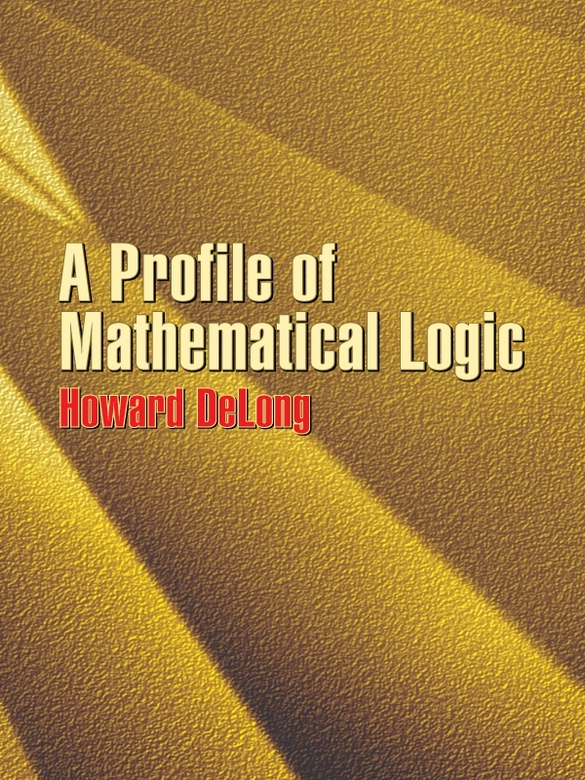
For permission to quote from the indicated sources, I wish to thank the following publishers:
The American Mathematical Society for Recursively Enumerable Sets of Positive Integers and Their Decision Problems, by Emil Post, from The Bulletin of the American Mathematical Society , Volume 50, 1944.
Cambridge University Press for The Thirteen Books of Euclids Elements , 3 volumes, second edition. (Translated with introduction and commentary by T. L. Heath.)
Clarendon Press, Oxford, for The Development of Logic , by William and Martha Kneale; for A History of Greek Mathematics , by Sir Thomas Heath; for Infinity: An Essay in Metaphysics, by Jos A. Benardete; and for The Oxford Translation of Aristotle, translated under the editorship of W. D. Ross.
Doubleday and Co. for The Birth of Tragedy and The Genealogy of Morals by Friedrich Nietzsche (translated by Francis Golffing).
Holt, Rinehart, and Winston for Introduction to Non-Euclidean Geometry, by Harold E. Wolfe.
Harvard University Press for From Frege to Gdel: A Source Book in Mathematical Logic, edited by Jean van Heijenoort and for A Source Book in Mathematics, edited by David Eugene Smith.
John Wiley and Sons for Mathematical Logic, by Stephen Cole Kleene.
North-Holland Publishing Co. of Amsterdam for Computer Programming and Formal Systems, edited by P. Braffert and D. Hirschberg; for Abstract Set Theory, by Abraham A. Fraenkel; and for Foundations of Set Theory, by Abraham A. Fraenkel and Yehoshua Bar-Hillel.
Open Court Publishing Co., La Salle, Illinois, for Contributions to the Founding of the Theory of Transfinite Numbers, by Georg Cantor (translated with an introduction by Philip E. B. Jourdain), and for Euclides ab Omni Naevo Vindicatus, by Giralomo Saccheri (introduction and translation by G. B. Halsted).
Oxford University Press for The Republic of Plato, translated by F. M. Cornford.
Raven Press for The Undecidable: Basic Papers on Undecidable Propositions, Unsolvable Problems, and Computable Functions, edited by Martin Davis.
Viking Press for The Ingenious Gentleman Don Quixote de la Mancha by Miguel de Cervantes Saavedra (translated by Samuel Putnam) and for The Portable Nietzsche, translated by Walter Kaufmann.
By Lewis Carroll
What, nothing to do? said Uncle Jim. Then come along with me down to Allens. And you can just take a turn while I get myself shaved.
All right, said Uncle Joe. And the Cub had better come too, I suppose?
The Cub was me, as the reader will perhaps have guessed for himself. Im turned fifteen more than three months ago; but theres no sort of use in mentioning that to Uncle Joe: hed only say Go to your cubbicle, little boy! or Then I suppose you can do cubbic equations? or some equally vile pun. He asked me yesterday to give him an instance of a Proposition in A. And I said All uncles make vile puns. And I dont think he liked it. However, thats neither here nor there. I was glad enough to go. I do love hearing those uncles of mine chop logic, as they call it; and theyre desperate hands at it, I can tell you!
That is not a logical inference from my remark, said Uncle Jim.
Never said it was, said Uncle Joe: its a Reductio ad Absurdum.
An Illicit Process of the Minor! chuckled Uncle Jim.
Thats the sort of way they always go on, whenever Im with them. As if there was any fun in calling me a Minor!
After a bit, Uncle Jim began again, just as we came in sight of the barbers. I only hope Carr will be at home, he said. Browns so clumsy. And Allens hand has been shaky ever since he had that fever.
Carrs certain to be in, said Uncle Joe.
Ill bet you sixpence he isnt! said I.
Keep your bets for your betters, said Uncle Joe. I meanhe hurried on, seeing by the grin on my face what a slip hed madeI mean that I can prove it, logically. It isnt a matter of chance.
Prove it logically! sneered Uncle Jim. Fire away, then! I defy you to do it!
For the sake of argument, Uncle Joe began, let us assume Carr to be out. And let us see what that assumption would lead to. Im going to do this by Reductio ad Absurdum.
Of course you are! growled Uncle Jim. Never knew any argument of yours that didnt end in some absurdity or other!
Unprovoked by your unmanly taunts, said Uncle Joe in a lofty tone, I proceed. Carr being out, you will grant that, if Allen is also out, Brown must be at home?
Whats the good of his being at home? said Uncle Jim. I dont want Brown to shave me! Hes too clumsy.
Patience is one of those inestimable qualities Uncle Joe was beginning; but Uncle Jim cut him off short.
Argue! he said. Dont moralise!
Well, but do you grant it? Uncle Joe persisted. Do you grant me that, if Carr is out, it follows that if Allen is out Brown must be in?
Of course he must, said Uncle Jim; or thered be nobody to mind the shop.
We see, then, that the absence of Carr brings into play a certain Hypothetical, whose protasis is Allen is out, and whose apodosis is Brown is in. And we see that, so long as Carr remains out, this Hypothetical remains in force?
Well, suppose it does. What then? said Uncle Jim.
You will also grant me that the truth of a HypotheticalI mean its validity as a logical sequence does not in the least depend on its protasis being actually true, nor even on its being possible. The Hypothetical If you were to run from here to London in five minutes you would surprise people, remains true as a sequence, whether you can do it or not.
I cant do it, said Uncle Jim.
We have now to consider another Hypothetical. What was that you told me yesterday about Allen?
I told you, said Uncle Jim, that ever since he had that fever hes been so nervous about going out alone, he always takes Brown with him.
Just so, said Uncle Joe. Then the Hypothetical if Allen is out Brown is out is always in force, isnt it?
I suppose so, said Uncle Jim. (He seemed to be getting a little nervous, himself, now.)
Then, if Carr is out, we have two Hypotheticals, if Allen is out Brown is in and if Allen is out Brown is out, in force at once. And two incompatible Hypotheticals, mark you! They cant possibly be true together!
Cant they? said Uncle Jim.
How can they? said Uncle Joe. How can one and the same protasis prove two contradictory apodoses? You grant that the two apodoses, Brown is in and Brown is out, are contradictory, I suppose?
Yes, I grant that, said Uncle Jim.
Then I may sum up, said Uncle Joe. If Carr is out, these two Hypotheticals are true together. And we know that they cannot be true together. Which is absurd. Therefore Carr cannot be out. Theres a nice Reductio ad Absurdum for you!
Uncle Jim looked thoroughly puzzled: but after a bit he plucked up courage, and began again. I dont feel at all clear about that incompatibility. Why shouldnt those two Hypotheticals be true together? It seems to me that would simply prove Allen is in. Of course its clear that the apodoses of those two Hypotheticals are incompatibleBrown is in and Brown is out. But why shouldnt we put it like this? If Allen is out Brown is out. If Carr and Allen are both out, Brown is in. Which is absurd. Therefore Carr and Allen cant be both of them out. But, so long as Allen is in, I dont see whats to hinder Carr from going out.
My dear, but most illogical, brother! said Uncle Joe. (Whenever Uncle Joe begins to dear you, you may make pretty sure hes got you in a cleft stick!) Dont you see that you are wrongly dividing the protasis and the apodosis of that Hypothetical? Its protasis is simply Carr is out; and its apodosis is a sort of sub-Hypothetical, If Allen is out, Brown is in. And a most absurd apodosis it is, being hopelessly incompatible with that other Hypothetical, that we know is always true, If Allen is out, Brown is out. And its simply the assumption Carr is out that has caused this absurdity. So theres only one possible conclusion. Carr is in!
Font size:
Interval:
Bookmark:
Similar books «A profile of mathematical logic»
Look at similar books to A profile of mathematical logic. We have selected literature similar in name and meaning in the hope of providing readers with more options to find new, interesting, not yet read works.
Discussion, reviews of the book A profile of mathematical logic and just readers' own opinions. Leave your comments, write what you think about the work, its meaning or the main characters. Specify what exactly you liked and what you didn't like, and why you think so.

